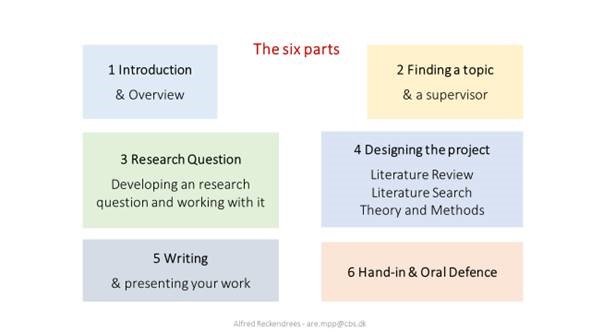The online tutorial has been developed by Alfred Reckendrees, Ana Maria Munar, Bersant Hobdari, Christoph Viebig, and Lara Monticelli. It introduces to working on a bachelor project and provides comprehensive overviews of each element that writing a Bachelor thesis involves. The 32 sections serve as tools for answering questions that arise and can be used in tune with the individual work process. The current beta version has been prepared just a few weeks before the first Covid lockdown.

While conventional historical narratives of entrepreneurship education focus on its rise in business schools since the 1970s, Dan Wadhwani and Chris Viebig trace its roots to the early nineteenth century and chronicle its evolution within the field of higher education more broadly. Using a comparative-history design, they show how changing social imaginaries of entrepreneurship education in Germany and the United States were based on divergent and evolving justifications of entrepreneurial autonomy and its relationship to the common good. Their narrative explores how these social imaginaries shaped the moral and political legitimacy of entrepreneurship and the aims, practices, and organizational forms of entrepreneurship education. They draw out the implications of this deeper history for entrepreneurship education today, including: (a) its current social imaginary, (b) the character of entrepreneurial knowledge, and (c) its relationship to the modern university.
See this video for more information on Social Imaginaries of Entrepreneurship Education
(Alternative link to view on youtube)
Not just since the Covid-19 pandemic has blended learning had a major impact on how we teach at business schools. In this article, Chris Viebig explores different blends and how to best use them in entrepreneurship education.
(Alternative link to view on youtube)
Philosophy of Science is a core building block to the education of well-rounded business professionals and scholars. Kurt Jacobsen, Thomas Presskorn-Thygesen and Anders Ravn Sorensen collaborated on developing novel and engaging Philosophy of Science teaching at CBS, helping students to question their perspective and outlook on the world - a crucial skill for business in fast-changing societies.
The history of management isn’t what it used to be. It used to be settled, neatly contained within a box. That box was often called “Chapter 2” in management textbooks... and it conveyed the idea that the business school taught management as a collection of subjects built upon economics and other sciences like psychology and mathematics. This history was part of any management student’s induction (or inculcation). It provided a solid foundation, but a limited palate. That monochrome palate was crisp, clear, and concise—and also pale, male, and increasingly stale. How do we rethink histories of the Business School? And how does that help us rethink the future of teaching business? Check out the special issue
"New Times, New Histories of the Business School" at Academy of Management Learning & Education or consult this short
video presentation.
It is core to Copenhagen Business School’s strategy to prepare students for grand societal challenges and an ever-changing business environment. CapLab (short for Capabilities Lab) is a strategic initiative centrally funded by CBS and carried out by an interdisciplinary group of researchers who purposefully integrate transformational capabilities into CBS’ educational portfolio. To learn more about their activities see,
caplab.cbs.dk or connect with the principal investigators
Chris Viebig and
Christina Lubinski.